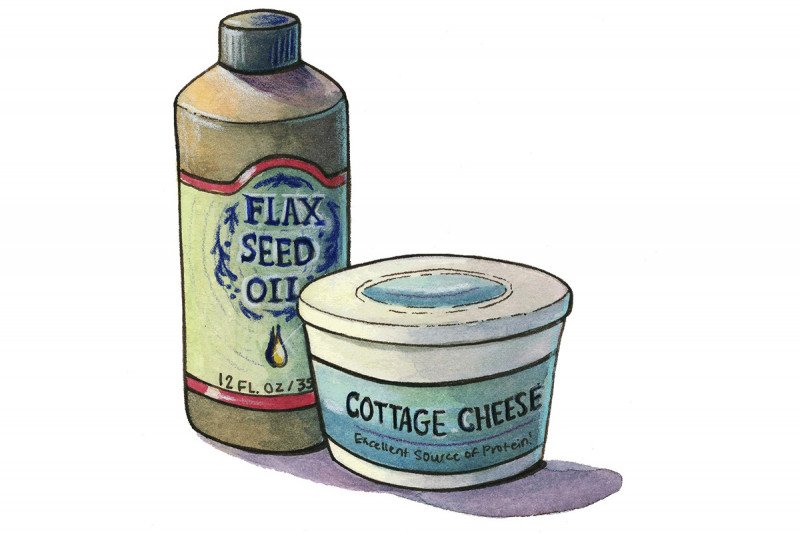
Common Names
- Budwig protocol
- Flaxseed oil diet
- Linseed oil diet
- Flax oil and cottage cheese diet
- Oil-protein diet
- Cellect-Budwig protocol
- Bill Henderson protocol
For Patients & Caregivers
Tell your healthcare providers about any dietary supplements you’re taking, such as herbs, vitamins, minerals, and natural or home remedies. This will help them manage your care and keep you safe.
The Budwig Diet has not been proven to treat or prevent cancer.
The Budwig Diet is an unproven anticancer treatment developed by the German biochemist Dr. Johanna Budwig in the 1950s. The diet consists of multiple daily servings of flaxseed oil and cottage cheese, as well as vegetables, fruits and juices. Processed foods, meats, most dairy products and sugar are prohibited. Budwig believed that the combination of cottage cheese and flaxseed oil, a food high in polyunsaturated fatty acids, would improve cellular functioning. Clinical studies have not been conducted to determine the effects of the Budwig diet.
While a diet consisting of large amounts of vegetables and fruits can be beneficial, diets restricted in meat and dairy products may reduce the intake of essential nutrients leading to nutritional deficiencies. Some variations of the diet encourage daily sunbathing to energize the fatty acids, and a coffee or oil enema. However, coffee enemas can result in electrolyte imbalance, infections, inflammation of the rectum and colon, and burns. High levels of sun exposure can result in an increased risk of sunburn and skin cancer.
- Cancer treatment and prevention
Evidence is lacking to support this claim.
- Nutrient deficiencies
- Sunbathing: Increases the risk of sunburn and skin cancer
- Flaxseed supplementation: Gastrointestinal discomfort such as gas, bloating, constipation, stomach ache and frequent bowel movements
Do Not Take if:
- You have bleeding disorders: Animal studies have shown that flaxseed oil can increase the risk of bleeding.
- You are pregnant: Animal studies indicate that flaxseed may increase the risk of breast cancer in offspring.
Special Point:
- Eating a well-balanced diet rich in vegetables and fruit can be beneficial for health. Restricted diets such as the Budwig Diet can cause severe nutritional deficiencies.
- Delaying or avoiding standard medical treatments can have serious consequences.
For Healthcare Professionals
Developed by Dr. Johanna Budwig in the 1950s, the Budwig diet is an unproven cancer treatment involving consumption of multiple daily servings of flaxseed oil and cottage cheese as well as vegetables, fruits, and juices. It prohibits intake of sugar, animal fats, shellfish, processed foods, soy, and most dairy products. It also encourages daily sunbathing (1) and is often combined with coffee enemas.
Budwig believed that cancer was caused by the lack of polyunsaturated fatty acids, and that a combination of flax oil and cottage cheese would improve cellular function. Although she wrote books and papers to provide anecdotal evidence and biochemical mechanisms of the diet, clinical trials have not been published in any peer-reviewed medical journal. Polyunsaturated fatty acids such as omega-3 found in flaxseeds have been shown to exert anticancer activities (2), but there is no evidence that such a diet has any benefit in preventing or treating cancer in humans.
Whereas a balanced diet consisting of vegetables and fruits can be beneficial for general health, restricted diets may increase risk of nutritional deficiencies (3). High levels of sun exposure can result in increased risk of sunburn and skin cancer (4).
Organic flaxseed combined with low-fat cottage cheese
- Cancer prevention
- Cancer treatment
Dr. Budwig developed the diet based on the hypothesis that cancer is caused by reduced uptake of oxygen by cell membranes in the absence of omega-3 fatty acids (O3FAs) such as linolenic acid (7). While metabolic changes such as increased aerobic glycolysis and fatty acid synthesis occur in cancerous cells, (8) the role of O3FAs in the pathogenesis or cancer treatment is still under investigation (2). Polyunsaturated O3FAs in flaxseed oil have been shown to decrease levels of proinflammatory cytokines, TNF-alpha, and IL-1 beta (9). O3FAs also demonstrated antineoplastic properties by increasing intracellular ROS and decreasing protumorigenic prostaglandins (2). Flax oil supplements increased total phospholipid fatty acid content in erythrocytes (10), but the implication of this finding in cancer treatment is unknown. Flaxseed supplements also inhibited in vitro proliferation of human prostate (11) and breast cancer growth by downregulating growth factors and increasing p53 expression (12). Whole flaxseed contains lignans, phytoestrogens that may also have antineoplastic properties and exert hormonal effects (13).
Budwig believed that combining cottage cheese and flaxseed oil improved availability of essential fatty acids through the plasma membrane, thereby improving aerobic cellular respiration (1). The effect of cottage cheese consumption on the bioavailability of O3FAs has not been studied. Processed fats, saturated fats, animal fats, processed foods, and sugar are prohibited in the Budwig diet because they are thought to interfere with oxygen uptake and cellular respiration. Epidemiological studies show that people who consume lactovegetarian diets have lower incidence of gastrointestinal cancer compared with non-vegetarians (14) (15), although these studies indicate association rather than causation.
Greater tumor regression was reported in mice treated with trastuzumab therapy plus flax oil compared with those treated with trastuzumab alone (16).
- Delaying or avoiding standard treatments can have serious consequences.
- Restricted diets may result in nutritional deficiencies.
- Lactovegetarians may be at greater risk for vitamin B12 deficiency (3).
- Excessive sun exposure and tanning beds can increase risk of melanoma and skin cancers (4).
- Adverse events associated with flaxseed consumption include GI discomfort such as gas, bloating, constipation, stomach ache, and frequent bowel movements (18).